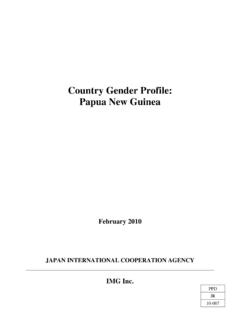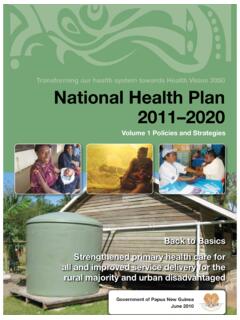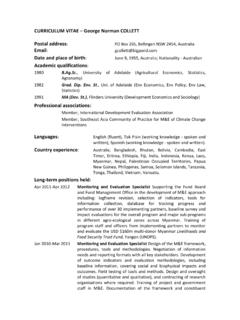Transcription of Decentralization and HRH - WHO
1 1 Round table Decentralization and Human Resources : Implications and Impact Riitta-Liisa Kolehmainen-Aitken, MD, DrPH Senior Program Associate Management Sciences for Health, Boston Abstract : Decentralization of political and administrative power, combined with a civil service reform, are increasingly prevalent components of health sector reform. The wider implications of Decentralization for human resources development are, however, poorly researched and inadequately understood. This paper analyzes these implications from the experience of the author, her colleagues at Management Sciences for Health, and published literature.
2 Four important human resource issues are found to emerge as a part of the process of transferring power to lower management levels. They are the adequacy of available information on human resources, the complexity of transferring staff, the impact of professional associations, unions and registration bodies on the design and implementation of management structures and jobs, and the morale and motivation of health workers. The key human resource domains where problems arise as a result of the way in which decentralized management systems are structured, are identified next.
3 Organizational structures, roles, and responsibilities may become inappropriate, conflict with each other, be disputed or poorly communicated. The viability of developing health services and human resources in a coordinated manner may be in jeopardy because of deteriorating databases, reduced planning capacity, inequitable or inappropriate staff allocation, or Decentralization -induced difficulties in career development. The retention of an appropriate training capacity may be threatened, if mistakes are made in allocating training responsibility.
4 Technical and managerial competence may be reduced by a shortage of skilled staff or the deterioration of supervision systems. Finally, performance conditions may be impaired if Decentralization impacts on the timely payment of wages and benefits and the availability of essential resources. Recommendations for other health leaders include becoming an advocate for human resources, anticipating and preparing for the cost and complexity of Decentralization , developing a strategic human resources development capability, investing in developing staff, and monitoring the impact of Decentralization .
5 Key Words : Decentralization , human resources, power, reform, health sector, 2To conduct great matters and never commit a fault is above the force of human nature. (Plutarch - AD in Life of Fabius) Introduction Decentralization of political and administrative power is becoming an increasingly prevalent component of health sector reform in all parts of the world, from Asia to Africa, from Europe to South America. This transfer of power away from the center is often combined with an effort to reform an outdated and cumbersome civil service structure.
6 These reform processes are particularly true of countries under structural adjustment, where funding agencies such as the World Bank are important partners in the process of reform, and in many instances its driving force. Yet the wider implications of Decentralization for human resources planning, training, and management (jointly referred to as human resources development in this paper) are generally poorly researched and inadequately understood. Human resources are the most important component of the health care system in converting available pharmaceuticals, medical technology, and preventive health information into better health for a nation.
7 Training young people to become skilled health workers takes a long time and the cost of employing them once they are trained is high. In most countries, salaries and benefits consume up to three-quarters of the recurrent health budget. For these reasons, human resource considerations should command a great deal of attention in any Decentralization discussion. That this is frequently not the case reflects both the general inattention to human resource issues (other than training) that prevails in many countries and the conceptual vagueness of Decentralization .
8 Decentralization is a term that continues to be used to describe a wide variety of power sharing arrangements.(1) It can signify the transfer of limited administrative responsibility from a central Ministry of Health to local health offices or it can involve the creation of new governmental structures, such as provincial governments, which are responsible for providing health and many other services. The implications of Decentralization for human resources for health are greatly influenced by the degree to which political and/or administrative power is transferred, how the new roles are defined, what skills are available at the local level, and what administrative linkages exist between the different management levels, and between the central health authority and the other central government offices that influence resource allocation (such as Ministries of Finance and Civil Service).
9 Finally, they are also influenced by the degree of political will to make Decentralization work. A variety of political and economic reasons can influence a country to transfer power away from a central level. In recent years, however, Decentralization has often been implemented as an integral component of health sector reform.(2) Health sector reform aims to improve the performance of the sector, and ultimately, the health of the people, through a conscious process of setting sectoral priorities and policies, and then reforming the way health services are structured and financed to fit with the revised priorities and policies.
10 The consequent changes in 3organizational structures and institutions, such as National Ministries of Health or the Civil Service, have fundamental human resource implications. The success of health sector reform in reaching its laudable goals will thus depend greatly on the amount of thought and preparation that human resource issues have been given. This paper analyzes the impact of Decentralization on sound human resources development based on the experience of the author and her colleagues at Management Sciences for Health, and the published literature.

















